|
 Nie Xin walked into my ESL level Principles of Communication classroom full of energy, and began enthusiastic verbal activity with the other Chinese students. In other words, she was laughing and talking a lot. That was not normal for my new Chinese students. But this was a semester that was starting in January. Spring semesters were always a little different because most of the students had been at Harding for a semester and already knew each other. However, this was Xin’s first semester at Harding. Her English was good because she had transferred from an English-speaking university in the Philippines. Her hometown was Yueyang, Hunan, China, a suburb of the much bigger city of Changsha. 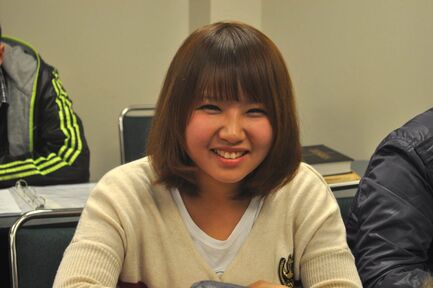 I met Nie Xin at the classroom door as I like to do with each of my students. I asked her in Chinese, “Ni jiao shenme?” (What’s your name?) To my surprise she answered in almost perfect-sounding English. So, what was she doing in my ESL level Principles of Communication class? I quickly remembered that just because someone speaks good English doesn’t mean they can pass an English equivalency test. Reading, writing and comprehension are a lot harder than speaking, especially when it comes to the myriad of spelling rules and exceptions in the English language. As usual on the first day of class, I explained a little about myself, then ran through the normal who-are-you, where-are-you-from, how-did-you-find-Harding questions. When I came to Nie Xin, knowing her English was pretty good, I asked her the same questions but also asked her to tell us more about herself. She perked right up and told the class her name was Nie Xin, but her “fake name” was Nicole. There probably would have been more laughter from that line, but most, if not all of the Chinese students there either didn’t understand her English, didn’t know what the word “fake” meant, or failed to see the humor she was injecting into this conversation. Over time I concluded that Nicole was an extrovert looking for a group to belong. She moved in and out of her Chinese community, and in and out of the American Harding community with greater ease than almost all the other Chinese students I'd previously taught. She had an infectious smile and piercing eyes that held contact with whomever she was speaking to. Her constant laughing and cajoling were something that made other people want to meet and warm up to her. She made everybody feel comfortable. And yet, at the same time, she seemed to be a bit of a loner. She functioned in her daily activity without the group of like-minded students that normally accompanied one of our Chinese students. To be sure, she had a lot of friends, but I really wouldn’t be able to say who her tribe was. Nicole was also extremely independent. When she had the opportunity to move off campus and out of the dorms, she lived in an apartment without a roommate. She traveled back and forth to China by herself and usually didn’t need much counseling to navigate her way through the Harding University system. I’m not sure why, but my perception was that she was unhappy. Her enthusiasm for all things in life and school seemed to drop off when the discussions turned to majors and careers. Her major was finance. Being the non-analytical, creative person I am, I jokingly feigned my disdain for such disciplines. Nicole lit up, saying, “Yes, that’s exactly how I feel about it, too!” WAIT…WHAT??? “You don’t like finance? Why did you choose it for your major?” I inquired. This is when I learned a bit more about the Asian culture and the relationship between students and their parents. “My parents chose this major for me,” she said as she rolled her eyes, “but it’s NOT what I would have chosen.” There was so much to unpack there. The culture of Asian group-think, the Chinese educational system, the teaching to testing, the concept of telling you the correct answer (as opposed to allowing the process to determine a correct answer even if it’s different from the parent’s or the teacher’s answer), along with the feared and famous GAO KAO, the college entrance exam that determines where you will go to university and what you will major in, were all swirling around my head. I had previously heard various discussions on all of the above, but now I had a real-life Chinese student sitting before me who did not want to accept what her parents, mentors, teachers, tests and culture told her she needed to do to be happy and successful in life. “Oh? Tell me more,” I asked. And tell me she did. Finance was the major her parents told her she had to study. Why? In their minds, it was the best opportunity for her to find a good job and have a better-than-average chance of having enough earnings to live comfortably in China. Anytime a Chinese parent espoused something like this, there was the subtle implication that one day the child would take care of them. That is, in fact, the Chinese Social Security system. Nicole was an only child, as was the norm for children born in the one-child era, but she was also a female. This did not bode well for future earnings and broad, stable, familial, socio-economic implications. Unfortunately, females are not valued as much as males in Chinese culture. Nicole’s parents were teachers and school administrators, which are comfortable, long-term and secure jobs in China. I can’t even count the Chinese students I’ve had who, upon asking them why they chose the major they did, gave me an inquisitive look as if to say, “What do you mean, ‘Why did I choose that major?’” It was simply the norm to have parents decide what major and career track their child would pursue. For some reason, as the semester unfolded, this discussion came up more often than usual. After several bits of explanation, I finally asked Nicole, “What would your major and career choice be if you could choose for yourself?” To my surprise, she responded, “I would want to do what you do!” “Teach?” I asked? “No, advertising.” This, of course, is the discipline in which I worked for many years before becoming the advertising professor at Harding. I responded, “Let’s talk. Come by my office sometime, and we can continue this discussion there.” (Better in my office than in class in front of all the students who were sitting there in disbelief—disbelief that she would go against her parents’ demands or go into advertising at all, which most thought was a non-existent job in China.) A few days later there was a knock on my open office door, and I looked up to see Nicole smiling back at me. “I wanted to talk to you about changing my major to advertising.” She sounded almost relieved that she had actually muttered those words. “Yes, come in and have a seat.” I pointed to a chair and invited her to have some freshly brewed Chinese green tea that I keep in my office for visitors. For the next 45 minutes or so, I went through our curriculum, schedules, requirements and such, to give her a complete description of what we offered. I wanted to make sure the advertising program I was managing was the same or similar to what she had in mind. It was, and she was excited to sign up. Knowing why she was a finance major, I may have dampened the mood when I asked whether she had discussed this with her parents. “No…” she said sheepishly. “I’m not sure how to do that.” “Well, you just pick up the phone and call them,” I said jokingly. I was glad she saw my humor and laughed. “Yeah, I know the technology, but I’m not sure what to say, how they will react, or what they will say.” “I’m sorry,” I said, “I just can’t help you with that.” She eventually made that call to her parents and recounted to me later that she actually made told them in a series of calls and slowly dropped this on them until they realized what she was telling them. They DID NOT like it at all! Soon after that call, Nicole became an advertising major. She was especially gifted in the areas of photography and media strategy. Copy writing? Not so much. Even though her spoken English was pretty good, it was still her second language. My perception of her was that she was a “creative” searching to find a place to display her talents. For the next couple of years Nicole rocked along the advertising major path even though she was the ONLY Chinese student in the program. That is very rare among our Chinese students. They seem to operate in groups. It’s a part of their collective culture. Nicole took Introduction to Advertising, Broadcast Advertising, Print Advertising, Advertising Campaigns and the appropriate marketing and communication classes needed to graduate. She was successful—and she loved it! She was also loved by the other ad majors who all became her new tribe. 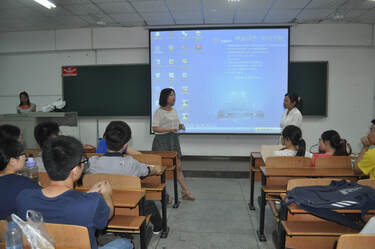 In the summer of 2013, I was going to teach in a visiting-professor program at Nan Hua Da Xue (The University of South China) in Hengyang, Hunan, China. I wasn’t exactly sure where Nicole’s hometown of Yueyang was located, but I told her toward the end of Harding’s spring semester where I would be that summer and asked how far away she lived from there. Her eyes lit up. “That’s pretty close!” she said. “Great! Why don’t we make plans to meet in China?” While I love to travel in China and visit my students in their various hometowns, I know it’s a lot easier for the students to find me than for me to find them. So, I invited Nicole to come to Hengyang and hang out for a few days with me and the four American Harding students who would be traveling with me. 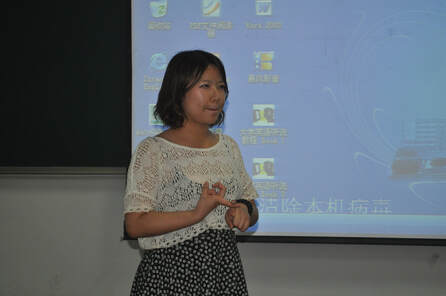 A couple of weekends into my teaching assignment in Hengyang, Nicole and one of her friends from her hometown came to visit us. I invited them to come to some of my classes. One class was an advertising class. I told Nicole how I was having trouble communicating in my poor, broken, translated Chinese and asked if she would help me. The next class was magic! Nicole, one of my advertising majors from Harding University in America, was now standing next to me in front of about 120 Chinese students teaching advertising with me in China! I explained advertising principles and what they were seeing on the screen in my bilingual PowerPoint, and she repeated it in Chinese. We bantered back and forth, and we simply had fun doing so. The students laughed, oohed and aahed as she explained the things I had taught her back in America. When we were finished, the students began to clap. I looked at her and held out my hand to her. We walked towards each other, held hands, lifted them high in the air and took a bow together, much like that after a stage-ending performance, while the students applauded exuberantly! Our encore? We had a Q&A session, as I usually do, but this session took on a bit more fun. Nicole would often re-answer questions directed to me, except she was answering in Chinese and getting a much better response of laughter and applause than I was! Nie Xin and I were quite the team. I swelled with pride and it was truly a “goosebumpy” moment in my life! Back in the States in the fall of 2013, Nicole signed up for my COMM 304 Broadcast Advertising class. I love that class because it embodies many of the creative elements I love about advertising and because it reaches back to my younger days when I was more involved in creating radio and television commercials than I am now. One class assignment was a group project to create a television commercial for the Doritos chip company and enter the finished product into a national competition in which the winning entry would be shown during the Super Bowl telecast in February 2014. There were two groups in this TV commercial project. Each team had the same assignment. Each team had to come up with a creative idea; write a creative brief; write copy; create a storyboard; select locations, actors, costumes, make-up and props; etc. Then they had to shoot video, edit it, produce a 30-second commercial following all the requirements of the contest and post it on the Doritos commercial website. Plus, as a group they had to decide who was going to do what and when it needed to be done to meet the contest rules and deadline. Nicole was assigned, or perhaps volunteered, to do the make-up and costuming for a commercial that reflected a popular theme at that time, The Walking Dead. Taking this assignment as a bit of a challenge and a creative outlet, Nicole set about figuring out how to make everybody look like they had just been resurrected from the ground. She found a tutorial on YouTube for what she needed. WOW! She did an amazing job and produced something I had no idea she had in her! Here’s a photo of us together showing the final product. When I asked her to smile for the photo she said, “No! Stay in character.” I recall thinking, “Nicole really picked the right major!” That finance major was so in her rear view mirror at that point. It was another goosebumpy moment for me. A few weeks later, in December of 2013, Nicole decided she wanted to take a class that was essentially a field trip with our Communication Department to New York City. The class would visit communication and public-relations-oriented businesses, organizations and media outlets and do so for college class credit. In addition to whatever each student learned about the various professional outlets, perhaps a greater learning experience from the trip was being together with 25 or so like-minded college students along with the chosen, elite professors of the Communication Department, (not me). This was roughly a 10-day venture to New York City and Washington, DC. Hotel rooms, meals and flights were a part of this group dynamic. Students were assigned roommates for the hotels in New York City and DC. Nicole was paired with McKenna Carr. I asked if she knew McKenna and she said no, but everyone she knew was already paired up, so rooming with McKenna was fine with her if it was OK with McKenna. I knew McKenna Carr. I and KNEW that Nicole would be blessed by rooming with McKenna. I told Nicole not to worry—it would be a wonderful experience for her. McKenna Carr was a public relations major from Huntsville, Alabama. She was smart, pretty, self-confident, caring, giving and a delightful Christian young woman. McKenna worked hard on her assignments for all her classes. She exuded Christ-like qualities in all she did and said. I never worried that McKenna would be anything but warm, friendly and welcoming to Nicole, even though they had not met before. I never gave Nicole’s experience another thought, knowing she would love McKenna. Little did anyone know the impact McKenna would have on Nicole during those days in New York and Washington. Early in the spring semester of 2014, a few weeks after attending our NYC and DC field trip, Nicole came to my office and said, "I want to get baptized! “What?” Where had that come from? I had a lot of questions for her. “How long have you been thinking about this? Have you been studying the Bible with somebody?” I felt a little guilty that I had developed a loving, mentoring relationship with Nicole and never pursued this discussion with her beyond casual conversation. I was intrigued with her desire, so I just bluntly asked, “After all this time in my classes and even spending time with me in China, I’ve never heard you even mention this. What made you decide to become a Christian now?” Much to my surprise she said, “It was the New York trip.” “WHAT? The New York trip? What…why…” She cut me off in my stuttering. “I roomed with McKenna Carr on that trip. I was a little worried that she wouldn’t want to room with me, a girl she didn’t know from China, rather than one of her American friends. But she welcomed me and treated me great. She always included me in wherever she was going or eating, and I saw her friendly and loving nature in everything she did and said.” And then Nicole said words I will never forget: “If McKenna Carr is a Christian, I want to be like her!” Forget the advertising slogan, "I want to be like Mike." I want to be like McKenna was so much more powerful! Wow, that’s quite a testimonial for friendship evangelism. Nicole grew up an atheist in China. She had little or no knowledge of the process of being baptized and becoming a Christian. She asked me how to get started. I explained to her that anybody could help her with this and if she wanted me to, I would be happy to make the arrangements. We set up a time and place to immerse her into Christ. I also asked her if we could invite our friends and family to this event. “Yes, of course,” she replied. “Are there any of your friends that I should invite to your baptism?” 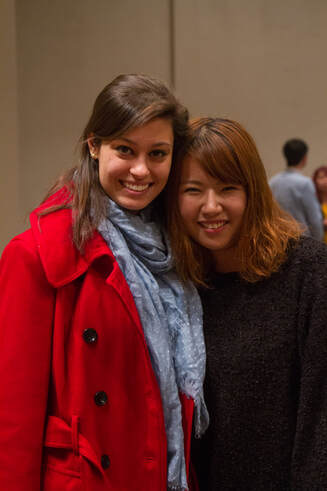 “Yes,” she said. “I want McKenna to be there.” I called McKenna and she was thrilled to come, but I don’t think I ever thanked McKenna for being the fragrance of Christ that she was to Nicole. I baptized Nicole the next day, and it was truly one of the “goosebumpiest” moments of my life and career as a professor at Harding University. I was planning to go back to China to teach again in May 2014 after Nicole graduated, this time in Wuhan, Hubei province, a city that was even closer to Nicole’s hometown of Yueyang than was Hengyang from the summer before. I told her I wanted to meet her in China again. She couldn’t, because she planned to stay in the States and move to San Diego or Los Angeles to find work in advertising. Nicole then said, “But I do want you to go by my hometown—my parents want to meet you!” GULP. UH-oh! I was a bit reluctant since I was the one who had encouraged her to follow her own dreams and NOT major in finance as her parents had wanted, and then to go into advertising of all things! In May of 2014, just a few days after Nicole graduated, I headed to Wuhan. I was to be a visiting professor at Jianghan Da Xue University. (There’s no translation for the school’s name because Jian Han is the name of a person.) This campus was primarily for residents of Wuhan and the children of the city government workers. It had about 15,000 students on a huge campus. It took me about 35 minutes to walk from my on-campus apartment to my classroom each day. I walked that route to and from in the morning and to and from in the afternoon. Plus, I lived on the sixth-floor apartment, with no elevator. I could say a lot more about Jianghan University, but that is a story for another blog post. The city of Wuhan was an easy train ride away from the Changsha/Yueyang area where Nicole’s parents lived. It’s hard for me to discern how far away any city is to another because of their use of kilometers and my poor math-conversion skills. It was also difficult for me to comprehend because of their fast train system, traveling as much as 340km per hour (over 211 miles per hour) made intercity travel easy and quick. All I really knew was the fast train would get me to Changsha in about an hour. When Nicole asked me to meet her parents, I knew it was close enough to where I would be, and I was happy (sort of) to meet them. I love meeting my students’ parents, telling them how much I enjoyed teaching their sons and daughters and thanking them for allowing me to do so. Nicole assured me that her changing majors would not be a problem and that she had spoken so often about me that they wanted to meet “Xie Jiaoshou,” (Professor Shaner). Still, they spoke little to no English, and my Chinese was not going to be sufficient. So, I asked Qu Xiaoya (Alice), a Chinese student from Nan Hua Da Xue I’d had in previous years, if she would travel with me to meet Nicole’s parents. Alice had become like a Chinese daughter to me starting in 2013 when I first met her. Alice lived in Hengyang, so she was near Wuhan and could easily join me. With Alice at my side to translate for me, we went to the train station in Changsha at a designated meeting place there inside the station —a KFC— restaurant, and waited for Nicole’s Momma. As we stood outside the restaurant waiting, Alice was on her phone letting Nicole’s mother know we were there. I then saw Alice reach her hand way over her head and wave as if to say, “I’m the one waving at you.” I looked across a massive amount of Chinese people in the train station and saw Nicole waving back at us! No, wait, that wasn’t Nicole, it was Nicole’s Momma! Wow, did they look alike! I could have picked her out of that mass of people without any help from Alice or anybody else. 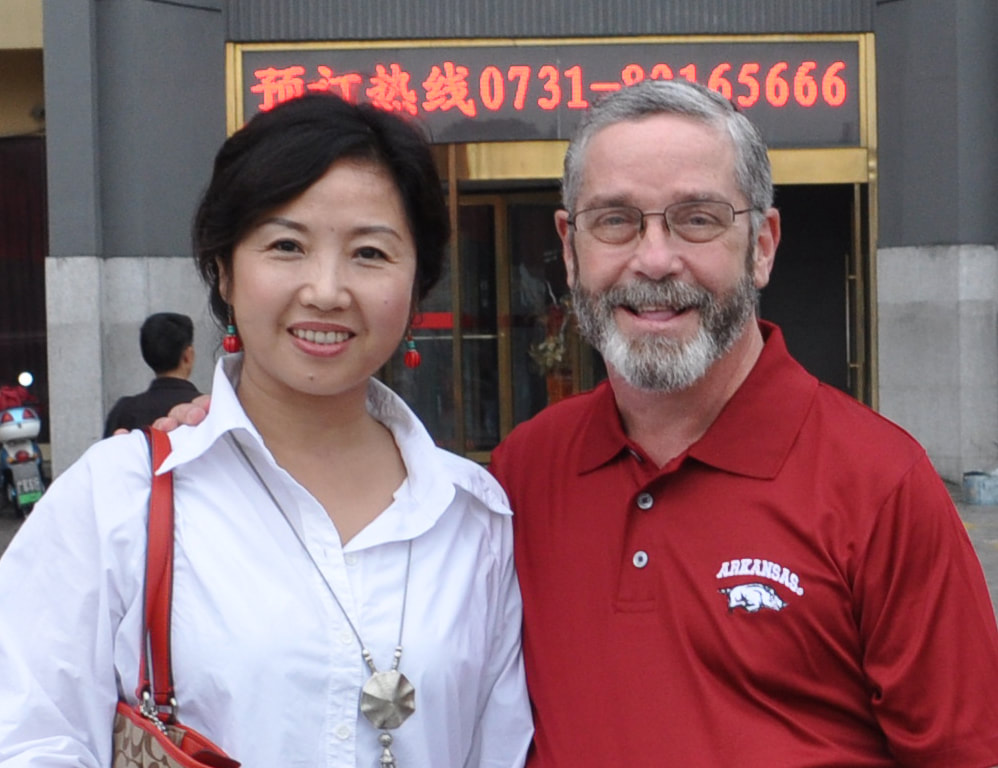 Nicole’s Momma had dinner plans for us. By now, she knew Alice would be with us, which was OK because Nicole's Momma had invited about six or seven other people to join us. The Chinese culture never counts who’s coming; the more the merrier. We headed to dinner. I hit it off with her parents like Nicole and I had back in the States. After all, even though they were still younger than me, her parents were a lot closer to my age than Nicole was. Nicole’s Baba (father) was waiting for us at the restaurant. He was a high school principal in their suburb of Yueyang and her Momma was a high school teacher in Changsha. They had not previously known I was bringing my own fanyi (translator), so they had invited about three or four Chinese teachers who taught English in high school to be our translators for the evening. They also knew we would be more comfortable with a bigger, less intimate group. Of course, in keeping with Chinese tradition, they wanted me to sit in the seat of honor around a large, round table. I always feel a little self-conscious and not worthy to have that seat, but not taking that seat would have been an insult. However, I always break protocol in these situations by having the translator to sit right next to me instead of their designated place across the room. I told them I wanted Alice to sit next to me, and they gladly obliged. I always have the translators that travel with me sit on my left. I knew that on my right was supposed to be my host. When they got to talking fast and expecting me to keep up with their conversation, it was Alice’s job to simply lean in and whisper in my left ear what they were saying while I smiled. We ate, talked, laughed and had a wonderful night. It was one of the most delightful and fun evenings I ever had with a room full of strangers in all my travels to China, or anywhere for that matter. After dinner I wanted to get a photo with Nicole’s Momma so I could post it on social media for Nicole to see that I had actually met her parents. 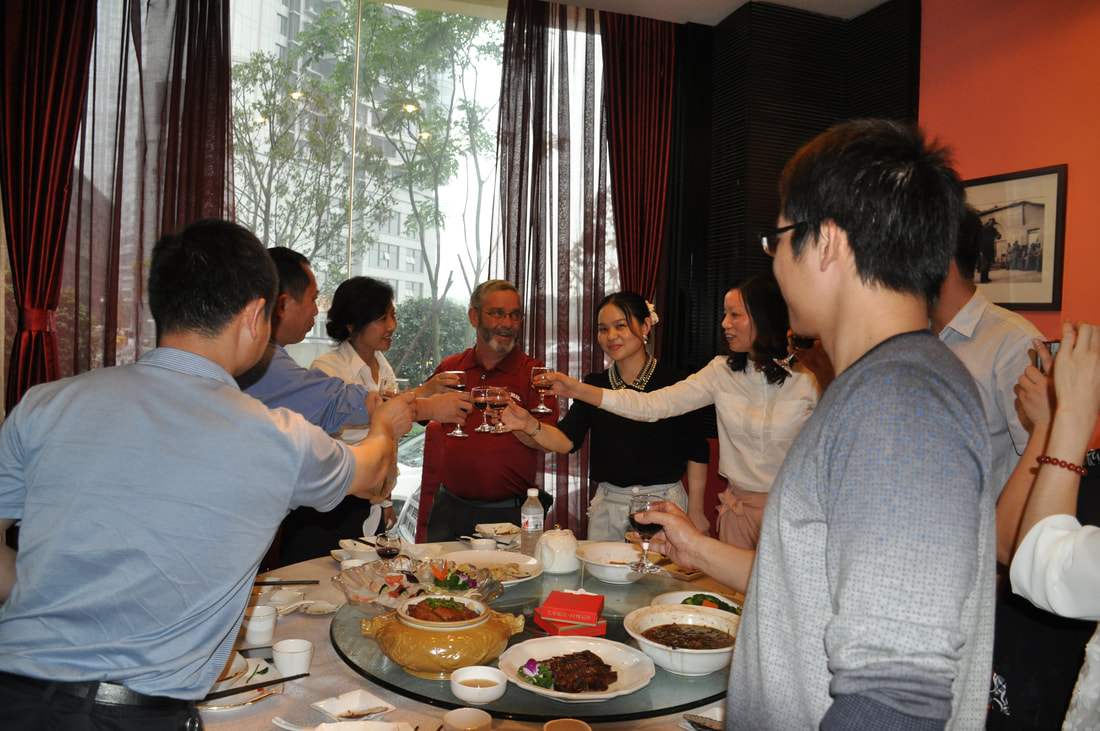 The English teachers were particularly outgoing, friendly and fun. We laughed, hugged and acted like we were old friends. Then one of them spoke to Nicole’s Baba in Chinese. Everybody got quiet and leaned in to listen. What were they saying? I never asked, but the look I gave Alice communicated exactly what I wanted to know. She leaned in and said, “They are trying to figure out how you can come back and speak at one of the Chinese high schools in Changsha.” Oh man, I would love that invitation. I told Alice to tell them that I would love that to work out. They invited me to come back to Changsha the next week and speak to a combined group of high school English teachers from all over the city. The location was going to be a large meeting room on one of the campuses of a large middle school. They made arrangements for me to travel back on the train, stay in a hotel, with meals and a stipend, to make this presentation. When I arrived the next week, I found out the venue where I was to make my presentation was the same middle school Nicole attended when she first started learning English. Ming De Middle School had 7,000 students. Wow, talk about coming full circle! The invitation had some loose directions of what they wanted me to speak about; how professors and teachers in America prepared, related to students and delivered their craft. They also wanted me to tell them about my life of being a professor to Chinese students in America. After a morning touring the school, visiting with many officials and students, having lunch in their canteen and a nap on a couch in the library with about 20 other teachers stretched out on the furniture, it was finally time for me to speak. They had invited every high school English teacher in the city. There were probably 200 people waiting for me when I walked into the room. I was a little intimidated. As I entered the room, they stood and applauded! I took a deep breath to take it all in. I started, as I often do, with a PowerPoint with lots of photos, telling them about me, my wife and family, then my career that that was culminating at that moment and how wonderful it was to be standing in front of them. I made sure they all knew that one of their own, Nie Xin, was one of my favorite students at Harding University. I went on to tell them about school and university life, but when it came time for the Q&A, every single question came back to families: the lifestyles of my family and the other families in America. There were no questions about education systems and procedures. I’ve given thousands of speeches and presentations over the last forty years or so, but I don’t ever remember being better received and more honored to be speaking to a group than I was right then. Standing in that room to speak and looking across the room, I could almost see Nicole smiling, clapping and waving at me from the back row. It was truly another goosebumpy moment for me. When I returned to Searcy, I had one more meeting with Nicole. She had not yet left for Los Angeles but was to do so in just a few days. The night before she left, my wife and I took her to dinner at the Fuji Steak House as a sort of a good-bye send-off. At dinner, I had one more request of her. “Can we take one last picture of us together?” What I didn’t tell her was that I wanted to replicate the photo I had made with me and her mother in China just a few weeks previous so I could put them side-by-side. What do you think? Eventually, it was time to say good-bye. I welled up with tears as we hugged each other. She thanked me profusely for what she said, “changed her life.” Yep, goosebumps again! 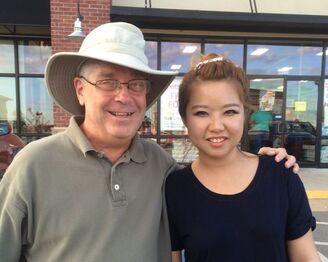 I always have such mixed emotions when my students graduate and leave me. I know they are supposed to leave, but it's like going through empty nesting again, and again, and again! But Nicole now saying goodbye and moving on was even harder for me. The next day, Nie Xin, (fake name Nicole), left for greener pastures to seek her fame and fortune in the advertising world. And while I have spoken to her on the phone and traded social-media messages with her several times, I have never-seen-her-since! 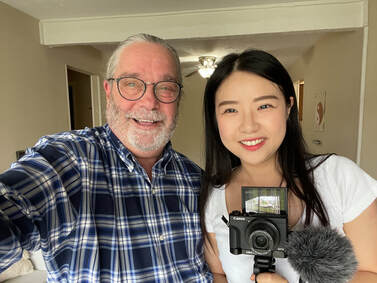 UPDATE - UPDATE - UPDATE God Works His Providence to Have Us Meet Again! On Wednesday, September 15, 2021, seven years and three months after watching Nicole drive away, I had a business trip to Montgomery, Alabama and heard she had moved there just a few weeks previous. We connected and had a Joyful reunion... Stay tuned to this blog for a complete reporting of developing news. The Story Continues - Thursday, October 21, 2021 Nicole made the short four hour drive from Montgomery, Alabama to our home in Ringgold, Georgia, for a long weekend visit. I wanted to spend time getting reconnected with Nicole as well as giving her some needed rest and relaxation from the first few weeks of graduate school after traveling across country from Los Angeles to start this new chapter of her life. We laughed, ate good food, went to several tourist attractions shooting video and photos, and even a little bit of editing and production once we got back to the house. On that Saturday evening we invited a family to come and eat with us so they could meet Nicole. Jody Barr and his wife Xia Wei, along with their two daughters to get acquainted and share stories of living in China and America. Jody and Wei had just moved to the Chattanooga area from, of all places, Montgomery, Alabama. Nicole had only been in Montgomery for about two months and knew almost nobody. But, Jody and Wel had a good female friend, Cynthia, that was Chinese and very close to Nicole's age and suggested they meet? They actually connected on WeChat right there at the dinner table. When Nicole returned to Montgomery she and Cynthia met and have become best friends since then. More...
0 Comments
Leave a Reply. |
AuthorSteve Shaner is a professional story teller that delights in traveling to meet new and old friends. He can be contacted at [email protected]. Archives
April 2023
Categories |

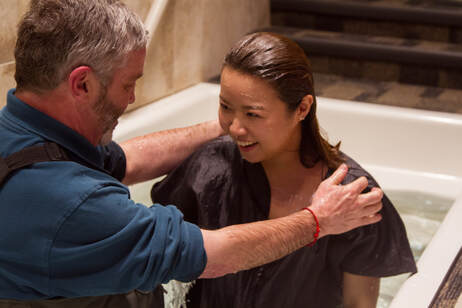
 RSS Feed
RSS Feed